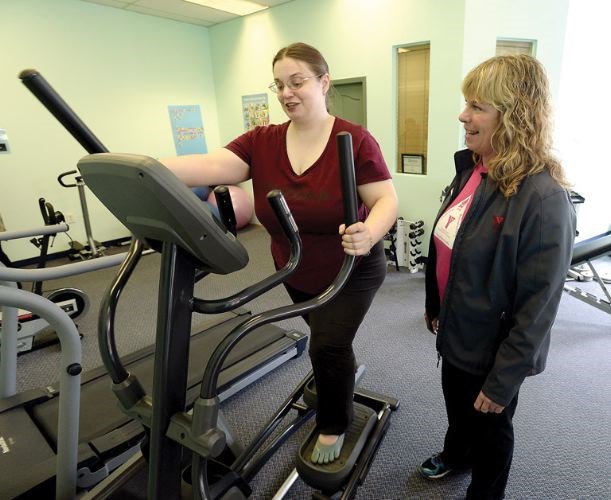A Prince George project is getting people with mental illness to take part in directing the activities that lead them to live healthier lifestyles.
Margaret Tayti was a member of the Activity Centre for Empowerment (ACE) before it launched the three-year study in 2013 with the help of other community partners.
Now, she's a peer leader and has watched the project impact both her health and others in the program.
"It has been huge because I'm not just accountable to myself anymore," said Tayti, 42, who leads a functional fitness group. "I'm trying to stay upbeat even when I've had setbacks."
She's noticed participants are quicker to bounce back from health setbacks.
"One of the things that keeps me coming out has been watching their improvements," Tayti said. "I think that having that sense that you can do anything, even if it's one little tiny thing like getting on the treadmill or on the elliptical for a few minutes.
"That gives you the power to say 'Well if I can do that, what else can I do? Because the universe isn't telling me I can't anymore," she said. "You get a much stronger sense of self from that."
People with mental illness are more likely to face diabetes, heart disease and obesity, said Candida Graham, lead researcher. They also have a 20 per cent shorter life span.
So, they organized focus groups to help direct strategies to address those numbers.
"It was quite the eye opener," said Graham, a professor with the Northern Medical Program.
"For me it was like exercise and diet but for mental health service users it was having friends, it was feeling connected, it was feeling valued. It was having enough money to put a roof over your head as well as having enough to spend on health and food."
The project follows about 60 people and is a partnership between the Activity Centre for Empowerment (ACE), YMCA of Northern BC, the Northern Medical Program and Chinook Yoga studio.
Some activities it offers include a walking program, yoga and fitness classes at the Sixth Avenue ACE location, a community kitchen program and a peer-led tobacco reduction program.
For Tayti, ACE's space provides a safe environment.
"They may or may not have the same issue that you do but they'll at least understand some of what you're going through."
"What happens a lot of the time is when you have a mental challenge, your physical health goes to hell. You either have too much anxiety to go out walk on the street or you have all of the social phobias you don't want to leave the house."
That hasn't been her experience. Tayti lives with a rare genetic condition that meant removing one kidney and living with significant lung disease, where they operate at about 31 per cent.
"When your body's trying to kill you, it makes you depressed," she said, and while she hasn't seen significant weight loss yet, she still feels the impact of her involvement.
"Having some control over my body, even though I haven't had the weight loss happen yet still means I've been empowered to make a change," said Tayti, who has dropped six sizes. "I can see some of it in the mirror and I can see some of it in the compliments I'm getting from friends who see my outlook seems to have changed to them."
The project has already changed understanding and informed international research around barriers and things that help with healthy living, Graham said.
"The barriers were known about stigma and illness but a lot of the facilitators weren't known and this is what's come from this group," said Graham, again pointing to feeling empowered, valued and creating social connections.
"When you put those into a program they're more likely to be successful."



